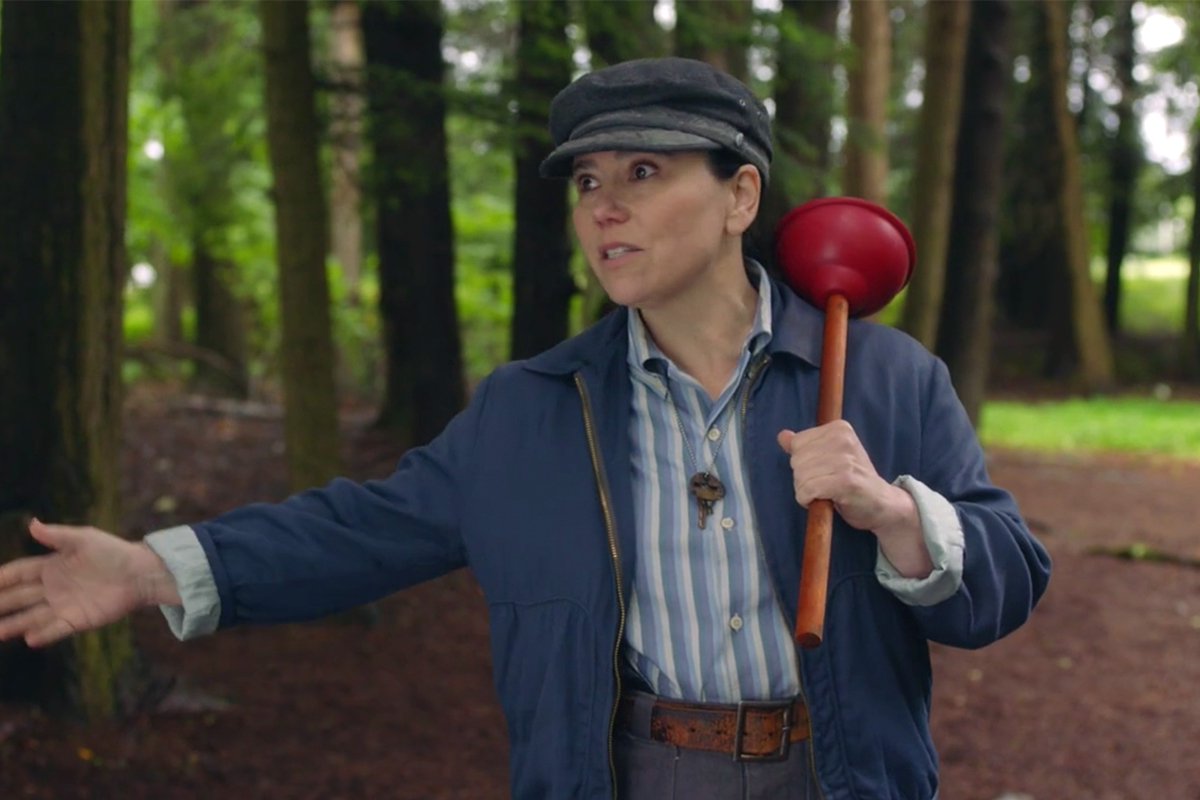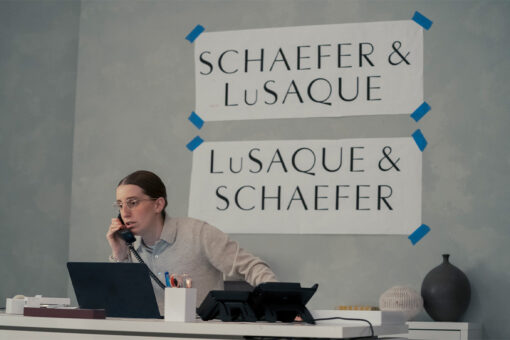There is a line I use when heterosexual television feels queer and I want to get some laughs: “If you squint…” Its uses are many; as in, “If you squint, Blue Crush is a story of two lesbians pursuing their surfing dreams,” or, “If you squint, Tim Riggins is the butchest lesbian on the football team.” It’s taking a slanted implicit energy and making it explicit; it’s a delightful way to light up more choices for queer representation in a media landscape that can still feel so joyless and dark.
We’ve been squinting for queer characters for decades of course, ever since the Hays Code made it almost impossible for them to be shown on film and media makers were forced to rely on innuendos and visual cues that would allow viewers to “read” between the lines.
Into this context comes Susie of The Marvelous Mrs. Maisel, the enterprising, tough, and boundlessly likeable comedy club manager played by Alex Borstein. Susie presents masculine, in trousers and a newsboy cap, and is often mistaken in the show for a man. Borstein won the Emmy for the first season of her performance, as well as a deep cult following. Here was an openly queer character who wears her queerness and gender nonconformity with humor, complexity, and lots of screen time — or so we thought.
Susie’s sexuality was never addressed in the first season. This may be understandable — Midge was certainly the star, and with so much going on in her life, one could argue there wasn’t much time to explore Susie’s. Still, I had high hopes this would be rectified in the seasons to come. In a between-seasons interview with Hollywood Life, Borstein said that there would be many scenes of Susie on her own in which the viewer will really get to see Susie’s “world.” She wrapped up by saying, “I think you’re going to be very happy.”
I am not happy. The second season of Maisel has dropped to mixed reviews — too chatty, too sanitized — but it was what happened with Susie that left me the most aghast and frustrated: AKA nothing. Susie continues to Susie around — she charms hit men sent to whack her, blends in amongst the comedy bros, and accompanies Midge to and from various comedy gigs — but unlike Maisel’s husband Joel and her parents Rose and Abe, Susie gets no substantive character development, or any development in her (surely queer?) life.
We see Susie struggling financially and renting her apartment out to an Italian family while she sleeps at the comedy club, but that is as far as “Susie’s world” seems to extend. Not once is Susie’s sexual or romantic personhood developed — we do not see her going to bars or on dates or feeling longing or having sex or looking at women or having relationships of any kind. It’s possible that Susie isn’t queer — butch straight women exist, after all — or asexual, but in the absence of plot points that would direct our understanding there, the assumption we make — in the wake of decades of Hays coding — is that Susie is a queer person who the show refuses to allow to actually be queer.
“I deeply deeply dislike what they are doing with Susie this season,” tweeted queer critic and writer Jeanna Kadlec. “I had higher hopes for butch representation on television, ESPECIALLY after Alex Borstein won an Emmy for this role. Alas.”
The pathetic lesbian best friend who is secretly (or not so secretly) romantically obsessed with the main (straight woman) character is another well-traveled trope, from the shows of today (Insatiable) to the movies of the past (Mean Girls, Boys on the Side), and one possibility is that Maisel is trying to use a similar plot as the answer to their perplexing Susie choices and omissions.
“Midge and Susie, it’s a love story, you know?” said Borstein in the same interview. “I’m not necessarily saying it’s a lesbian [love story], but it’s a female love story.” She also called the dynamic between Susie, Midge, and Midge’s husband Joel “a love triangle” in the sense that there is tension and the question of possession — does Midge fundamentally belong to Joel and their classic six on the Upper West Side, or does she belong to Susie and the comedy clubs of the lower west?
While these questions of loyalty and identity are the fruitful stuff of other important stories about the ways (ostensibly) heterosexual female friendship and love can get tangled (My Brilliant Friend chief among them), actual queerness adds another layer to this knot — one that Mrs. Maisel does not seem interested or willing to untangle, though whether from a cowardice of politics or craft, it’s hard to say.
“From a storytelling / structural perspective, exploring the often fraught secrecy of gay culture in the late ’50s and early ’60s would have been a really nice complement to Midge cracking open public/private lives of hetero, married women on stage,” tweeted the writer Kristen Evans. “The result, for Susie, in particular, is a kind of sexless, desire-less existence that doesn’t feel accurate to me? And all the rest is just a gesture.”
The Hays Code has been defunct since the late 1960s, yet we’re still squinting.
“When the ideas or forms we need are banished, we seek their residues wherever we can trace them,” writes Adrienne Rich in her 1983 essay Blood Bread and Poetry, a process Rich calls “a constant footwork of imagination, a kind of perpetual translation.”
Well. My muscles are tired. It would be nice for once to be able to watch queer lives with my eyes wide open.



